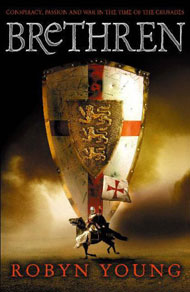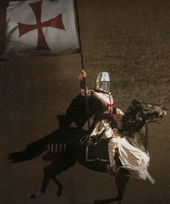
Anybody keeping an eye on upcoming books will probably have heard of Robyn Young's Brethren, the first in a highly anticipated trilogy of historical novels set during the Crusades.
Brethren's already been released in the States and immediately shot into the best-seller lists over there. I've no doubt exactly the same thing will happen here.
Niall Christie happens to be very good friends with Robyn and was kind enough to put me in touch with her regarding the possiblity of some radio interviews. Hopefully you can catch the lovely Dina Burgess interviewing her on 107.2 WinFM in early September.
Now, I'm in awe of writers. A few months ago I interviewed Ian Hocking, author of Deja Vu, and quizzed him on his approach to the writing process. Incredibly cheekily, I asked Robyn if she'd be kind enough to answer some similar questions.
And she did. Yay!
NOTE: I actually... erm... lost my questions in the period between writing to Robyn and her answering. (Apparently the same sort of thing happens to Michael Parkinson all the time.) The questions in bold are pretty much what I asked Robyn, but might not be exactly word for word.
 How long goes past between coming up with the idea for a story and actually sitting down and putting pen to paper?
How long goes past between coming up with the idea for a story and actually sitting down and putting pen to paper?It’s fairly hard to answer the first question, what length of time passes between the idea and the first moment of writing, as it varies from project to project. My first two novels, unpublished, were to be part of a fantasy series and I think I simply sat down to write them when I was inspired. Brethren was a much slower process, because of the fact that I had to do so much research before I could even think about facing the blank page. I also spent a few months playing around with different perspectives and characters before I began writing seriously.
RH: Do you plan your novels? What sort of planning process did you go through?
I had a pretty good idea overall what I wanted to include in the trilogy, in terms of particular events, characters and story lines. But I didn’t plan out Brethren as such. I worked on the novel for more than six years and in that time changed the narrative from first-person to third, did away with some characters and subplots, established and invented others, altered my style dramatically and found my voice. Rather than follow a rigid plan, this organic approach enabled me to experiment and discover what did and didn’t work. However, the penultimate draft did end up with a tangle in the middle, which was quite tricky to unravel. Now, partly because I’ve found my voice and partly to avoid tangles, I work in a very different way. I’m halfway through Crusade, book two of the trilogy, which I planned out completely before I started, to the point of writing an in-depth synopsis for each chapter. It’s an elaborate plot, covering seventeen years and several major historical events that are all connected to my fictional story. Because, now I’m published, I’m writing to strict deadlines, I cannot afford to finish the novel and discover that it doesn’t work. I need to know, from the outset, that it will. Of course, things do change in the writing of it: you find some ideas don’t work as well as you thought they would and certain characters take on more of a role than you anticipated. When that happens, I simply change my chapter breakdown accordingly. I think it’s a question of recognising and allowing the conscious and unconscious processes to work in their own ways: structure can keep you grounded and give you confidence, but you also need to allow your creativity to have its own way and let out its leash a bit.
How different was your first draft from the published manuscript?
I guess I’ve answered this question above! Yes, the manuscript in its first draft was very different to the novel that has been published. I have eleven versions of Brethren on my computer, to give you some idea.
What sort of editing process do you go through? How do you most effectively edit your writing?

I was writing Brethren whilst on two creative writing courses at university, one of them a Masters, and I picked up numerous editing techniques during this time. The most valuable for me, which had the greatest impact on my writing, was sharing my work with other writers. In groups we would read out our poetry or prose and give one another feedback. It’s no good if everyone in this group isn’t willing to be honest. I found you needed to develop a sort of sensitively brutal approach to be effective. Some people call it the shit sandwich. Start with a positive comment, then give the criticism, then cushion it with another positive comment. The key thing about a group like this is trust and that is pretty much the luck of the draw on courses. I was fortunate to work in a very tight group on my Masters, who were all serious about their writing and about giving and receiving feedback. When the degree finished, I set up a writers’ group with another student and the five of us have now been going for four years. Each member has had a real impact on the novel and has been invaluable in terms of support. I’d say the second best editing technique, after sharing work with others, is reading work out loud. You’ll pick up more mistakes, repetitions and clunky sentence rhythms this way than you will when just reading from the page.
Well, I found Robyn's answers fascinating and am incredibly grateful for her answering them. Check out Brethren (including dozens of glowing reader's reviews) on Amazon or visit Robyn's brilliant website at robynyoung.com.
I will confess, there was one other question I wanted to ask, but didn't have the guts to.
What safety precutions do you have in place to prevent Orlando Bloom (who probably kept his chainmail from Kingdom of Heaven) being chosen to appear in any possible film adaptations of Brethren?

No comments:
Post a Comment